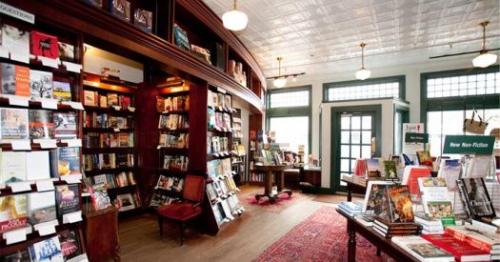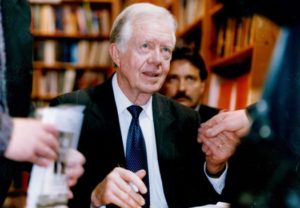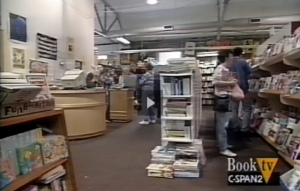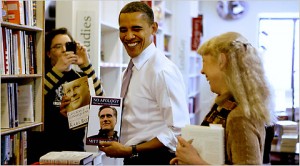Publishing Talks: Interview with Jeff Deutsch of Seminary Co-op Bookstores
October 12, 2021 by David
Filed under PublishingTalks, The Future
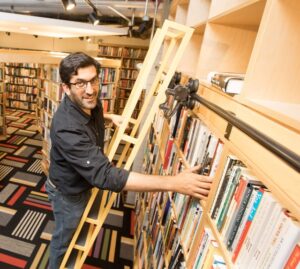 Publishing Talks began as a series of conversations with book industry professionals and others involved in media and technology, mostly talking about the future of publishing, books, and culture. I’ve spent time talking with people in the book industry about how publishing is evolving in the context of technology, culture, and economics.
Publishing Talks began as a series of conversations with book industry professionals and others involved in media and technology, mostly talking about the future of publishing, books, and culture. I’ve spent time talking with people in the book industry about how publishing is evolving in the context of technology, culture, and economics.
Some time back, this series broadened to include conversations that go beyond the future of publishing. In an effort to document the literary world, I’ve talked with a variety of editors, publishers and others who have been innovators and leaders in independent publishing in the past and into the present.
These conversations have been inspirational to me on many levels. I have gotten to speak with visionaries and entrepreneurs, as well as editors and publishers who have influenced and changed contemporary literature and culture. I’ve also had the opportunity to speak with a number of friends and colleagues I have met over the many years I have been in the book business.
This week’s podcast is one I am really excited about. Jeff Deutsch is the director of Chicago’s Seminary Co-op Bookstores, which calls itself the first not-for-profit bookstore in the United States whose mission is devoted to bookselling (there are other nonprofit bookstores of course, generally components of literary centers, like Beyond Baroque in Venice, California, Woodland Pattern in Milwaukee, and Writers and Books in Rochester, NY are examples).
Last spring I read a report of a Book Industry Study Group panel that included Jeff, and what he talked about immediately caught my attention. Deutsch was reported to have said that the model of bookselling we’ve inherited needs to be rethought: just facilitating more sales, more efficiently, is not the way for bookstores to survive. A bookstore that actually means something to readers will need to carry a deep backlist and to spend time helping readers discover new voices, new texts.
During that panel Deutsch said, “The publishing world and distributors—what you value is not our ability to sell books,” because independent bookstores can never sell in the same volume as Amazon. “Yet we all know how important bookstores are,” he said. As publishers and booksellers once knew, developing readerships for books and authors takes time and devotion that have been boiled out of the entire process now.
Jane Friedman’s outstanding book industry newsletter Hot Sheet compared Jeff’s approach to the Slow Food movement (I think that idea makes sense – I wrote a manifesto for publishers a few years ago on the idea of Slow Publishing, but never developed it enough to publish). Nina Barrett, owner of Bookends & Beginnings in Illinois (which has filed a lawsuit against Amazon), also on the BISG panel said “I think it’s like Alice Waters talking for decades about a sustainable food ecosystem and ultimately revolutionizing the food industry that way. That’s the point we’re at.”
As Jane pointed out, “independent booksellers will lose every time if they base their worth on the mere transactional value of selling books. His stance—that bookselling has a deeper meaning and cultural value—is indeed how boutique and online retailers outside of the Amazon ecosystem are positioning themselves for success.”
Deutsch also said, “We should figure out models that support the work that we’re trying to do, not shoehorn this other model of retail that is really just about buying and selling and not about culture….We all have vocational awe, but couldn’t we have vocational awe and still make a decent living?”
This conceptual framework resonates with me and I think is worthy of much more discussion. Why shouldn’t there be a nonprofit bookselling sector to promote literary and other noncommercial books and authors, just as there is a nonprofit theater? Why should we continuously try to fit a crucially important culture activity into a commercial model, and always fail?
I hope that hearing Jeff talk about this concept will help stimulate further discussion and concrete action. Please feel free to comment and if you are interested in helping, please be in touch.
Connect to the Seminary Co-op Bookstores website here.
Before joining the Co-op Deutsch was the director of stores for the Stanford Bookstore Group and prior to that managed the Cal Student Store at the University of California, Berkeley.

Podcast: Play in new window | Download
Publishing Talks: Interview with Roxanne Coady of R.J. Julia Booksellers
June 17, 2021 by David
Filed under PublishingTalks, The Future
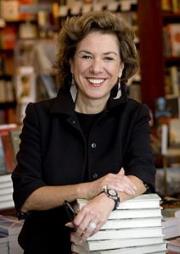 Publishing Talks began as a series of conversations with book industry professionals and others involved in media and technology, mostly talking about the future of publishing, books, and culture. I’ve spent time talking with people in the book industry about how publishing is evolving in the context of technology, culture, and economics.
Publishing Talks began as a series of conversations with book industry professionals and others involved in media and technology, mostly talking about the future of publishing, books, and culture. I’ve spent time talking with people in the book industry about how publishing is evolving in the context of technology, culture, and economics.
Some time ago, this series broadened to include conversations that go beyond the future of publishing. In an effort to document the literary world, I’ve talked with a variety of editors, publishers, booksellers, and others who have been innovators and leaders in independent publishing in the past and in the present.
These conversations have been inspirational to me on many levels. I have gotten to speak with visionaries and entrepreneurs, as well as editors and publishers who have influenced and changed contemporary literature and culture. I’ve also had the opportunity to speak with a number of friends and colleagues I have known over the many years I have been in the book business.
Bookstores have been an essential part of my entire life, even from early childhood, one benefit of growing up with a writer as father. Independent bookselling thrived from the late seventies into the late 1990’s, no doubt reflecting the Baby Boomer generation’s enthusiasm for books and ideas. The last twenty or more years have been very different, and now there are far fewer communities that support bookstores than at anytime in the past fifty years. Bookstores (along with public libraries) are a crucial element of a healthy culture, far more valuable than their size and scope would suggest. Local communities benefit from the presence of bookstores in many ways, and literary culture needs them too, as visible representations of a reading culture. Ideas grow and spread from books, but culture is also built around physically being present with one another.
So it is important for us to find ways as readers and literary citizens, to support bookstores, and it is equally important for booksellers to locate themselves, create and support communities around their stores, to support their workers and to make themselves meaningful enough to be thrive, despite the challenges of being small businesses in a mass-oriented consumer culture.
There are quite a few examples of booksellers who have made just such an impact, and their experiences and ideas are important for all of us to share and understand. It has been a particular pleasure for me to have known and worked with Roxanne Coady, the founder and owner of the exceptional R.J. Julia Booksellers, in Madison, Connecticut. We first met when Roxanne came to Connecticut to establish her new business after pursuing a successful career as a CPA in New York City. Over the years, I have spent many hours browsing their shelves, attending author events, and enjoying the cafe.
R.J. Julia has thrived during the period when local bookselling has faced an array of challenges, first from chain bookstores, then from Amazon and the rise of online retailing, and of course most recently, the pandemic. Throughout this time, Roxanne and her staff have innovated on many levels, including creating a drive-by pickup window for busy parents, putting on over 300 events a year (some of which are with celebrity authors), establishing an active email newsletter, providing online sales with speedy service, podcasting, and building an active book club. Throughout, the emphasis on community, care for staff as individuals, and listening to customers have been paramount characteristics of the enterprise. There is a bit of practical magic at work there, I think.
After more than 30 years of hard work and success, it’s obvious that Roxanne has quite a bit to say about what it takes to be a successful bookseller, to be a locally based business, and to be a crucial part of literary culture. I believe that our conversation should be meaningful for anyone interested in the future success of bookstores and the importance of building a real literary culture within a society that does not put enough value on books, authors, writing.
We need more bookstores! Visit the R.J. Julia Bookseller website and sign up for their newsletter.
Podcast: Play in new window | Download
David Wilk interviews Hungry Minds Bookstore Founder David Unowsky
May 31, 2017 by David
Filed under Publishing History, PublishingTalks
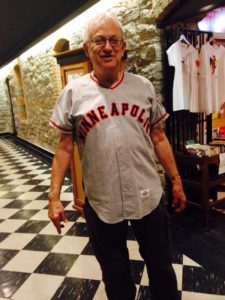 Publishing Talks began as a series of conversations with book industry professionals about the future of publishing, books, and culture. As we continue to experience disruption and change in all media businesses, I’ve been talking with some of the people involved in our industry about how the book business might evolve as our culture is continues to be affected by technology and macro-economic factors.
Publishing Talks began as a series of conversations with book industry professionals about the future of publishing, books, and culture. As we continue to experience disruption and change in all media businesses, I’ve been talking with some of the people involved in our industry about how the book business might evolve as our culture is continues to be affected by technology and macro-economic factors.
I’ve now expanded this series to include conversations that go beyond the future of books and publishing. I’ve talked with editors, publishers, booksellers and others who have been innovators and leaders in independent publishing, and will continue to explore the ebb and flow of writing, books, and publishing in all sorts of forms and formats, as change continues to be the one constant we can count on.
For the past several years, I’ve been talking to editors and publishers of independent presses about their work, including a number of important literary publishers. In this conversation, I am speaking with an old friend and colleague, David Unowsky, founder of the outstanding St. Paul bookstore, the Hungry Mind, which evolved into many other book related ventures, including a literary review and a successful independent press.
The store eventually sold its name to help stay in business in the face of ever increasing financial pressures, and ultimately, under its new name, Ruminator Books, closed in 2004. Which means it was in business for over 30 years, and was for most of that time an incredibly important place, not only to Twin Cities residents, but for the many writers and publishers whose work the store supported, and importantly provided an entry point into the book business for many individuals who have gone on to a wide variety of positions in the book industry.
The Hungry Mind was and remains for many, a special place, and David Unowsky was its beating heart and soul. I’m really pleased to have the chance here for David to talk about his work as a bookseller, communitarian, publisher and entrepreneur. David and “the Mind” – and all the wonderful people and books that passed through its doors – are central to our understanding of what might eventually be considered a “golden age” of books in our country.
Jan. 12, 1994: Former President Jimmy Carter made an appearance at the Hungry Mind Bookstore in St. Paul to sign his latest book,”Turning Point: A Candidate, a State and a Nation Come of Age.” In the book, Carter describes how his first race in the pre-civil-rights South almost was taken away by a political boss.
Photo: Minneapolis Star Tribune.
Screen shot from a 1998 C-Span program about Hungry Mind
Podcast: Play in new window | Download
Publishing Talks: David Wilk interviews Jan Weissmiller
April 8, 2010 by David
Filed under PublishingTalks, The Future
 In this series of interviews, called Publishing Talks, I have been talking to book industry professionals about the future of publishing, books, and culture. This is a period of disruption and change for all media businesses.
In this series of interviews, called Publishing Talks, I have been talking to book industry professionals about the future of publishing, books, and culture. This is a period of disruption and change for all media businesses.
How will publishing evolve as our culture is affected by technology, climate change, population density, and the ebb and flow of civilization and its economics? Publishing Talks interviews help us understand the outlines of what is happening, and how we might ourselves interact with and influence the future of publishing as it unfolds.
These interviews give people in the book business a chance to talk openly about ideas and concerns that are often only talked about “around the water cooler,” at industry conventions and events, and in emails between friends.
I believe these interviews give people inside and outside the book industry a chance to hear first hand some of the most interesting and challenging thoughts, ideas and concepts being discussed within the industry.
Jan Weissmiller recently achieved her fifteen minutes of fame when President Barack Obama visited her store – and the picture of her selling him a book went viral very quickly. But Prairie Lights Bookstore has more going for it than simply being the backdrop for the first citizen’s book buying habit writ large. It’s been a fixture in the strongly literary community of Iowa City since Jim Harris started the store there in the late ’70s.
As times have changed, so has the store, and today Prairie Lights has an active web presence in addition to its longstanding role as “the” local bookstore in one of the great small towns of middle America. I’ve been to the store many times over the years, and deeply admire the vision and care demonstrated first by Jim and Jan, when she was the first employee of the store, and now by Jan and her current wonderful staff of book devotees. Many towns no longer have the opportunity to experience the depth of knowledge that a great bookstore can provide. What Jan and Prairie Lights show us about bookselling is important – people use technology to make life easier, but people need other people to make life meaningful.
In case you missed it, here is the link to the NY Times story about Prairie Lights. And here’s the now famous photo.
Jan Weissmiller was the first employee of Prairie Lights, beginning in 1979, and is now its co-owner.
Podcast: Play in new window | Download


